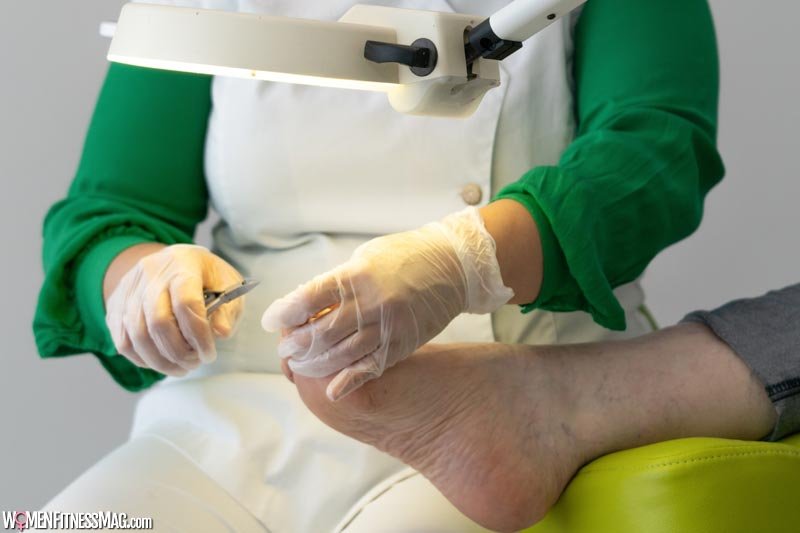Diabetic Foot Care: Why Podiatry is Essential for Managing Diabetes : Living with diabetes requires constant vigilance and proactive management. One area that often doesn’t receive the attention it deserves is foot care. If you have diabetes, taking care of your feet is not just about comfort, but a crucial aspect of your overall health.
This is where podiatry comes into play. Podiatrists are the unsung heroes of diabetes management, specializing in the care and prevention of foot-related issues that can have serious implications for individuals with diabetes.
The Importance of Foot Care in Diabetes
Diabetes can have a profound impact on the health of your feet. Elevated blood sugar levels can lead to nerve damage (neuropathy) and poor blood circulation, particularly in the extremities like your feet. This combination makes your feet more susceptible to infections, slow-healing wounds, and even amputation in severe cases. Not only do you need to find a specialist for regular podiatry Ryde based, but self-care is vital too.
Here’s why foot care is non-negotiable for diabetes management:
Nerve Damage Awareness: Diabetes-induced neuropathy can dull the sensation in your feet. You might not notice a small cut or blister, allowing it to escalate into a serious infection if not caught in time.
Circulation Issues: Poor blood circulation means that even minor injuries take longer to heal. This increases the risk of infections and complications.
Preventing Amputations: The gravest concern for individuals with diabetes is the risk of amputation due to severe infections. Proper foot care significantly reduces this risk.
Enter Podiatry: Your Foot’s Best Friend
Podiatrists are medical professionals who specialize in the diagnosis, treatment, and prevention of conditions related to the feet, ankles, and lower extremities. When it comes to diabetes, their role becomes paramount:
Regular Foot Exams: Just as you monitor your blood sugar levels, regular visits to a podiatrist for foot exams are essential. They can identify issues in their early stages, preventing them from worsening.
Customized Care Plans: Podiatrists understand that each patient’s needs are unique. They create personalized foot care plans that cater to your specific health requirements.
Professional Nail and Callus Care: Trimming nails and managing calluses might seem simple, but for someone with diabetes, a minor cut can lead to major complications. Podiatrists handle these tasks safely.
Wound Management: If you develop a wound or ulcer, a podiatrist is equipped to provide proper care to facilitate faster healing and reduce infection risks.
DIY Foot Care: What You Can Do
While regular podiatry visits are crucial, there are many steps you can take at home to ensure your feet stay healthy between appointments:
Daily Inspections: Set aside a few minutes each day to examine your feet thoroughly. Look for any redness, swelling, cuts, blisters, or other abnormalities.
Keep ‘Em Clean and Dry: Wash your feet daily with lukewarm water and mild soap. Pat them dry gently, especially between the toes where moisture can accumulate.
Moisturize Mindfully: Apply a moisturizer to prevent cracked skin, but avoid putting it between your toes to prevent fungal growth.
Trim with Caution: If you’re comfortable trimming your nails, do so straight across and file the edges. If not, leave it to the podiatrist.
Choosing the Right Footwear
The shoes you wear can greatly impact the health of your feet, especially for those with diabetes:
Comfort is Key: Opt for well-fitting shoes made from breathable materials. Avoid tight shoes that can lead to pressure points and blisters.
Diabetic-Friendly Shoes: These are specifically designed to reduce the risk of pressure ulcers, provide cushioning, and accommodate potential foot deformities.
Socks Matter Too: Choose moisture-wicking socks to keep your feet dry. Seamless options can prevent irritation.
When to Seek Professional Help
While your daily foot care routine goes a long way, there are times when you should reach out to your podiatrist immediately:
Wounds That Won’t Heal: If you notice a sore, wound, or ulcer that isn’t showing signs of improvement, it’s time for professional intervention.
Ingrown Toenails: These can quickly become infected. Avoid attempting to treat them at home and seek podiatric care.
Changes in Sensation: If you experience sudden numbness, tingling, or burning in your feet, it could indicate a worsening of neuropathy.
Conclusion
Diabetic foot care might not be the most exciting topic, but its importance cannot be overstated. Proper foot care, with the help of dedicated podiatrists, is a vital component of diabetes management. By being vigilant in your daily foot care routine and scheduling regular visits to your podiatrist, you’re taking proactive steps to prevent serious complications and ensure that your feet support you in leading a healthy, active life despite diabetes. Remember, your feet are your foundation – treat them well!
Related Videos about Diabetic Foot Care: Why Podiatry is Essential for Managing Diabetes :
Diabetic Foot Care: Why Podiatry is Essential for Managing Diabetes
importance of diabetic foot care, best diabetic podiatrist near me, diabetic foot care ppt, role of podiatrist in diabetes management, diabetic foot care health education, iabetic foot care articles, podiatrist diabetic foot care, diabetic foot care pdf,




